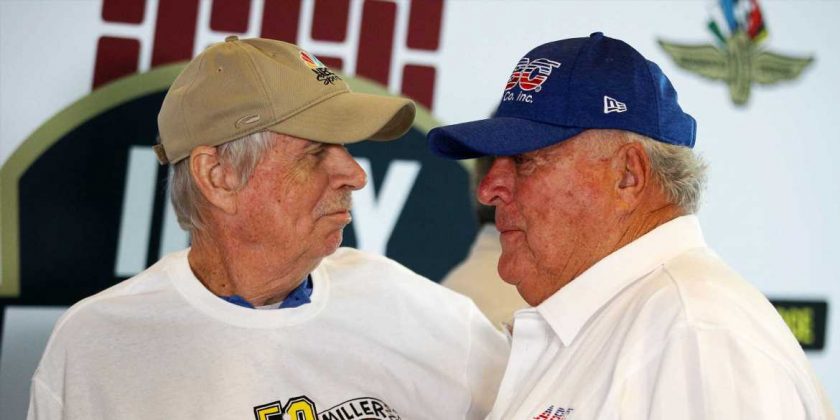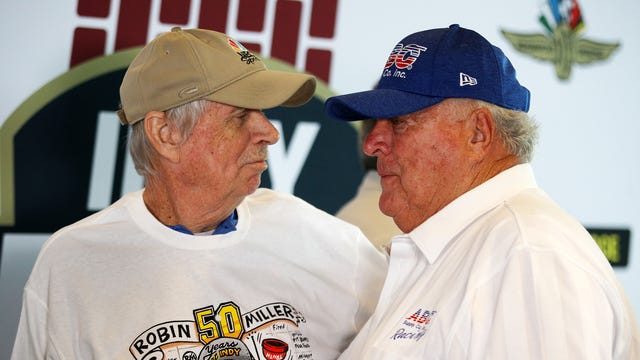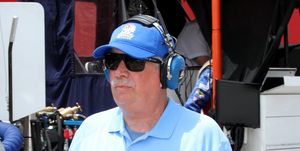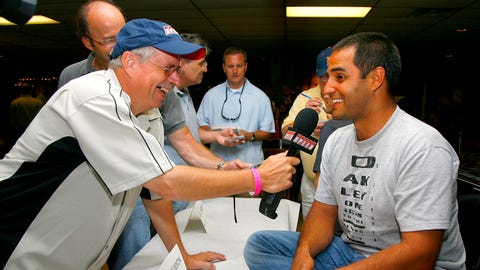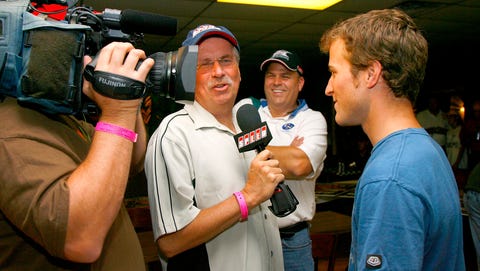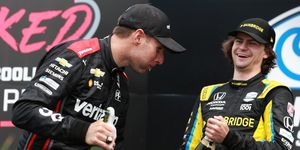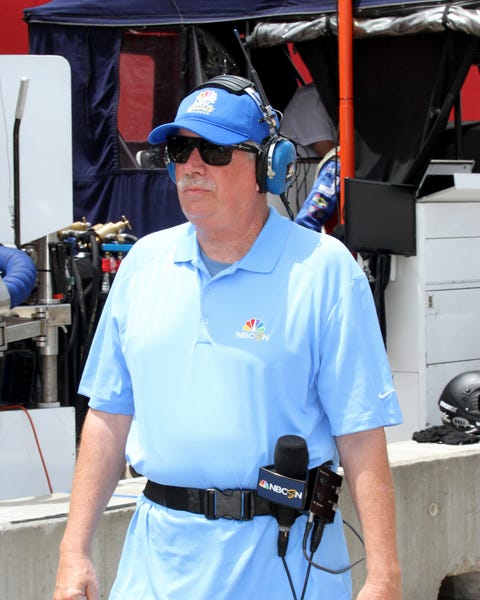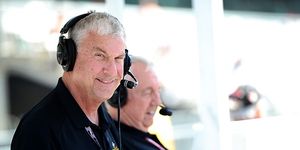Robin Miller is dead.
Given his long and painful battle with cancer, I knew I would likely be writing those four words one day. I just hoped it would be later rather than sooner. As recently as Tuesday, when she asked if I had heard how Robin was doing, I told my wife that I hoped he would make it to Christmas.
Yet now that day has come and it is still surreal to write, let alone read back, those words that Robin has indeed left us. He crossed the finish line of life and died Wednesday morning at the far too young age of 71. He’s finally out of his pain and agony, but has left an incomparable legacy that will be remembered for a long, long time.
In his passing, Robin joins another motorsports journalism icon, Bob Jenkins, who also left us way too young just 16 days ago.
Miller was a writer and columnist famous for covering the Indianapolis 500 and NTT IndyCar Series racing. He became a television personality first with ESPN, then SPEED and most recently NBC. Miller is a member of the incoming Motorsports Hall of Fame of America Class of 2021. That class will be inducted on Sept. 29 in Pontiac, Michigan.
He never retired from the job he loved. His stories and columns were carried in Autoweek, Car and Driver, Sports Illustrated and RACER, among other publications and websites through the years.
To see the slow, agonizing death both men endured as their bodies became increasingly ravaged by cancer scares the absolute living you-know-what out of me. Yet they met their respective battles head-on with a stoic strength, courage and outlook that oftentimes made people who maybe didn’t know the serious nature of their illnesses easily think as if they were suffering nothing worse than maybe a case of the sniffles.
But rather than dwell on Robin’s passing, I want to celebrate his life, one that combined the best parts of Damon Runyon and Dashiell Hammett (for you younger readers, look them up—but suffice to say they were some of the best storytellers ever, just like Robin), with a fastidious competitive attitude of wanting to be the first and the best to break news or tell a story as Mario Andretti and A.J. Foyt were at driving race cars.
I knew Robin for nearly 40 years. To this day, I still remember the first time I met him at Indianapolis Motor Speedway back in May 1984. We were in the old, almost decrepit infield media center and I’ll never forget how he came up to me one day and asked me something about the practice session that had just ended at the time.
I replied, he soaked in what I told him like a sponge, patted me on the back and said simply, “Thanks, kid.”
He turned, began to walk away, and then quickly added, “By the way, I’m Robin – Robin Miller of the Indy Star. If you ever need anything, let me know.”
Little did I know at the time that I was talking to a legend in the making, one of the most talented writers I’ve ever known—and read—and someone whose encyclopedic knowledge of IndyCar racing and other four-wheeled forms of motorsports was unmatched.
Robin was his own man. He never got married, never had kids (although he did have a sister and two nieces). The racing world was his family.
He didn’t care if he ticked you off, if you got angry at him, or whether you liked him. All he cared about was his readers and making sure he got the story right. I don’t think there is anyone in the motorsports world who didn’t get mad at Robin at least once for something he wrote about them. But like him or not, you had to respect the man because he made sure every story checked out before it ever made the light of day of print or digital.
What’s more, even if Robin made you mad, especially due to something he wrote, you couldn’t stay mad at him. I saw him go nose-to-nose several times with one of the most famous race car drivers ever (I’m not revealing his name to honor both his and Robin’s privacy). That driver called Robin every name of the book, starting from “son of a bitch” to, well, the long-form of the initials “MF.”
Yet, those anger management sessions would eventually fade and he and Driver X would remain extremely close friends until Robin’s passing Wednesday. In fact, I won’t be surprised if Driver X is chosen to be one of Robin’s pallbearers, or at the very least, one of his eulogists. In fact, I expect it, they were that close.
I ran into Robin literally dozens of times over the ensuing 37 years after I first met him. He almost always had a smile on his face, a strong and firm handshake and a confident-bordering-on-a-good-kind-of-cocky air about him.
And he almost always would call me “kid,” something we’d laugh about a lot (and which, at times, I would absolutely hate—and he’d once again laugh about because he knew it). It’s not like he forgot people’s names, it just was easier to have a non-descript disclaimer when he interacted with them. Hell, I even saw him call some of the most legendary racers in the world “kid”, even if they were older than him.
Today, as I reflect back on Robin’s life and our friendship, for whatever reason, I keep coming back to one memory, a non-descript Saturday afternoon during the IndyCar weekend at Portland International Raceway in 2018. It’s something that I shouldn’t have given a second thought of, yet it’s also something that just keeps sticking in my mind.
There was Robin, all by himself, sitting on a parked golf cart in the middle of the paddock. He looked like he was trying to get a quick nap in, while also working on his tan. He was dressed in his all-too-familiar NBC Sports T-shirt and jeans (before he’d change into his “work clothes” when it was his time to go back in front of the cameras).
I walked up to him and said “Hi Robin,” but I didn’t get a response. After maybe 15 seconds, I repeated, “Hi Robin” again and like a bear coming out of hibernation, he slowly acknowledged my presence and once again uttered those words I had heard dozens of times already:
“Hey, kid, how are you?”
Yep, that was me, the kid.
But this conversation was much different than any other we had ever had. After the initial pleasantries were over, after talking about our mutual roles at NBC Sports, Robin out of nowhere began waxing almost poetically about life.
“Man, aren’t we lucky guys? Sitting here on a golf cart, at a race track, watching the cars go by, enjoying the sun, breathing the air, just shooting the shit?” he said. “It doesn’t get any better than this, right, kid? Do you know how many people would kill to be doing the same?”
Those were some rather prophetic words from a man who was never at a loss for words, indeed.
I sensed something different in Robin, though. It was almost as if he was taking in and enjoying life like he never had before. He was appreciating the small things, like the sun shining down or just simply holding court while sitting on a golf cart, his feet propped up on the dashboard.
It was almost a year earlier that Robin was first diagnosed with bone cancer. But when he transparently told folks—either in conversation or in print—what he had, he wasn’t looking for sympathy or anything else. He was quite encouraged that it was a treatable form of cancer and that he expected to live a long, full life still.
Less than three years later, he’s now gone.
That sunny afternoon in Portland has served as a metaphor for my memories of Robin. While I’d still see him several more times after that day, for whatever reason that day will always stick in my mind. For it was a day that I saw Robin at his most laid-back, comfortable, at-ease self. It was like the rock star of motorsports was doing a stripped down acoustic set about life.
There isn’t a motorsports journalist around who didn’t respect Robin – or wish they were him. Sure, in later years, he became known for his work on TV, but to me and many others, he was and always will be the dean of motorsports writers. He told so many stories over the years that on the day of the 100th Running of the Indianapolis 500 in 2016, I saw him, exchanged pleasantries and somehow we got around to his prolific proclivity to tell the best stories around.
“There isn’t a motorsports journalist around who didn’t respect Robin—or wish they were him.”
I half-kiddingly asked him when was the tell-all book about his life coming out, with all those great stories.
He looked at me with that impish half-grin he was noted for and said with a huge, from-the-gut laugh, ‘Kid, I’d have to write two books: a small one of the stories I could tell, and another, much larger one of the stories I couldn’t tell—to protect the guilty.”
That wasn’t a joke, really, though. He knew more salacious details of the racing world, who slept with who, who partied too hard, etc., that would make TMZ envious – and maybe even blush.
I could go on for several thousand more words about Robin, his talent, his stories and his larger-than-life personality.
But instead, I’m going to close this by giving Robin a dose of his own medicine, so to speak, using that same one word I’ve wanted to say back to him ever since that first conversation we had back in 1984:
“We’re really gonna miss you, kid!”
Follow Autoweek contributor @JerryBonkowski on Twitter @JerryBonkowski
Source: Read Full Article
